
The Bottom Line
Introduction & Drive Details
Samsung is now selling its powerful PCIe Gen4 980 Pro NVMe SSD with a 2TB capacity point option. We are delighted with this for several reasons, the most important of which is our belief that 2TB is the current sweet spot for fast consumer NVMe storage. Samsung's 980 Pro series has already proven itself to be among the fastest consumer SSDs ever made. In fact, when we reviewed the 980 Pro 1TB back in September of last year, we declared it to be the best performing SSD we had ever tested. So naturally, a 2TB version is something we've been eagerly awaiting.
The 2TB 980 Pro is physically identical to its older, lower capacity siblings in that it is a preferred single-sided design featuring a Samsung "Elpis" 8-channel Gen4 x4 NVMe controller, a single Samsung LPDDR4 DRAM package, and two Samsung sixth-gen 3-bit V-NAND packages. The 2TB model we have on our bench today sports the same factory specs as the 1TB model with the exception of a 100 MB/s increase in sequential write performance, up from 5,000 MB/s to 5,100 MB/s.
It may be worth noting again that Samsung's 980 Pro series marks its departure from the Pro series being 2-bit (MLC) based and is now 3-bit (TLC) based. We like this move because it brings costs down significantly for consumers making the 980 Pro's massive performance accessible for more consumers. Additionally, and especially as it relates to consumer usage, there is virtually no performance penalty incurred by implementing denser 3-bit flash except in the rarest corner case scenarios.
We are fully on board with what Samsung has done with the 980 Pro's flash array because it makes sense. However, along with the introduction of the 980 Pro, Samsung made another change, or subtraction if you will, on the software side of what has always been offered as a complement to its NVMe offerings, that we are not fully on board with.
Samsung's proprietary NVMe driver is currently not available for usage with the 980 Pro, and while not a big deal in the overall scheme of things, it's something that the enthusiast in us misses having. Why are we missing it? Because Samsung's NVMe driver delivers performance that can be significantly better than that offered by the MS NVMe driver that's built into Windows 10.
Now, you might not be able to use Samsung's NVMe driver with a 980 Pro, but that doesn't mean that we can't. We can, and we will do so for a few benchmarks during the review. The benchmarks we run with Samsung's NVMe driver will not be charted. They will be shown for visual comparison and talking points only. In the case of CrystalDiskMark, the world's most well-known storage benchmark, Samsung's NVMe driver will be used to obtain stated factory sequential specs. We are of the opinion that factory sequential specs should always be attainable using CDM at default settings.
Now let's see how Samsung's best consumer SSD to date stacks up on our Gen4 exclusive chart as delivered by our enthusiast-level AMD Ryzen 5900x powered SSD test bench.
Drive Details
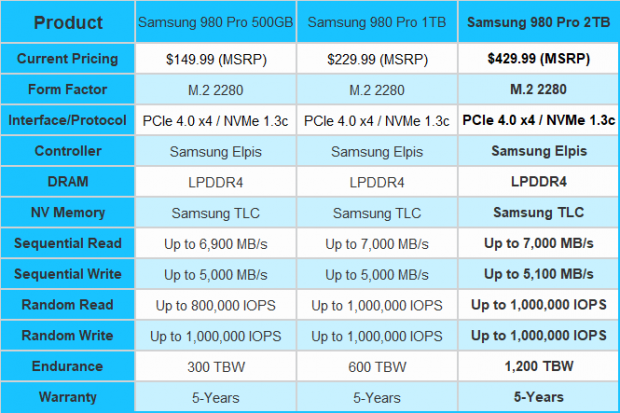
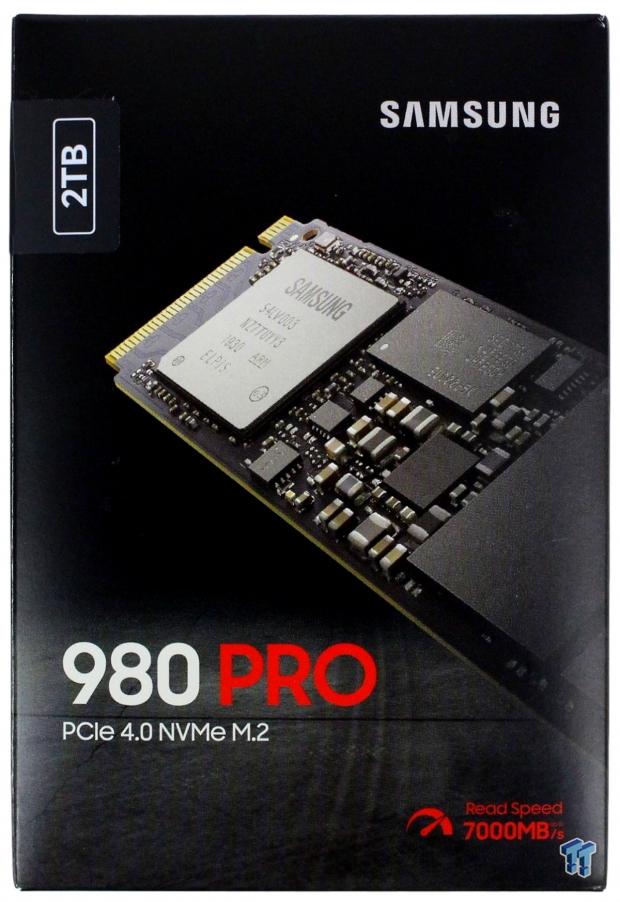
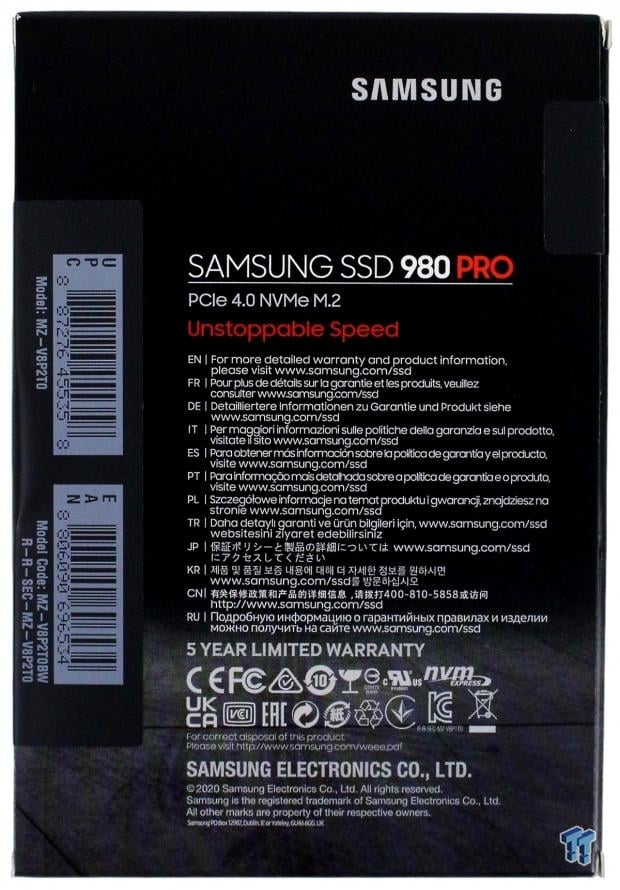


Jon's Test System Specifications
- Motherboard: ASUS ROG Crosshair Hero VIII Wi-Fi (buy from Amazon)
- CPU: AMD Ryzen 9 5900X
- Cooler: ARCTIC Liquid Freezer II 420 (buy from Amazon)
- Memory: Corsair Dominator Platinum RGB 32GB (2x16GB) DDR4 4000 (PC4-32000) C19 (buy from Amazon)
- Video Card: GIGABYTE GeForce RTX 2070 WINDFORCE 8G (buy from Amazon)
- Power Supply: Corsair AX1000 (buy from Amazon)
- Case: InWin X-Frame
- OS: Microsoft Windows 10 Pro 64-bit (buy from Amazon)

Free SSD Software
Samsung Magician/Data Migration
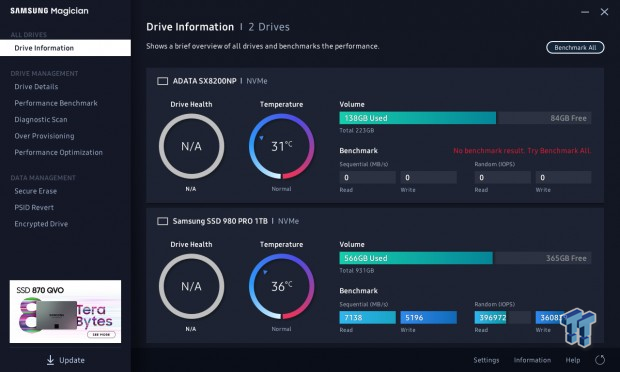
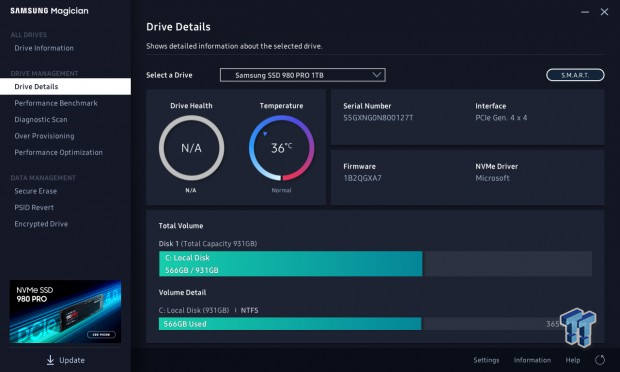
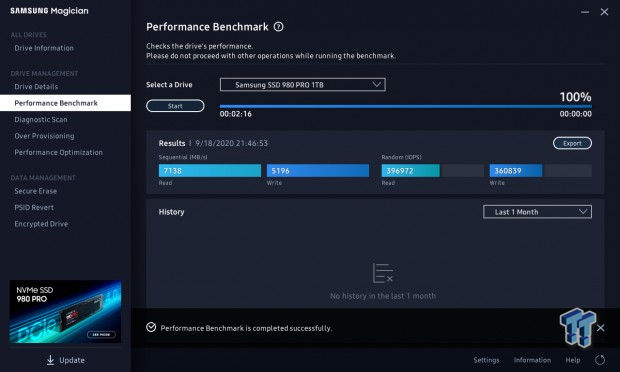
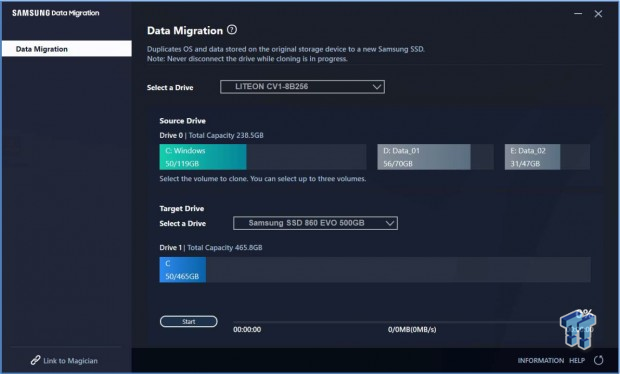
As always, when you buy a Samsung SSD, you get free supporting software that makes maintenance and system migration simple and free. You can download Samsung Magician here.
Synthetic Benchmarks: CDM & Anvils
CrystalDiskMark
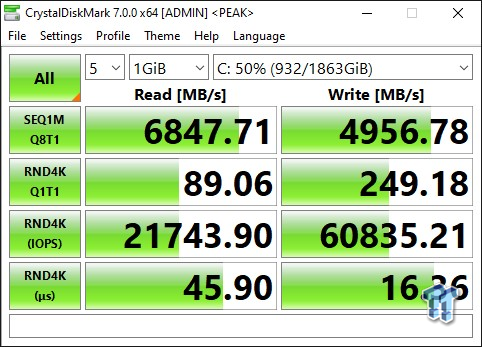
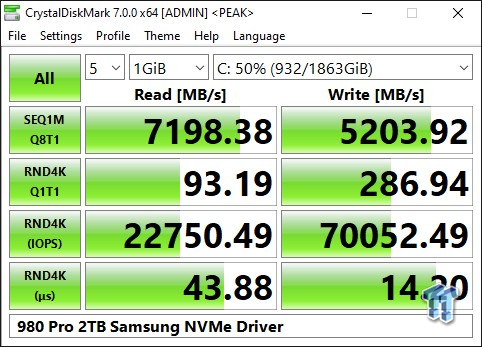
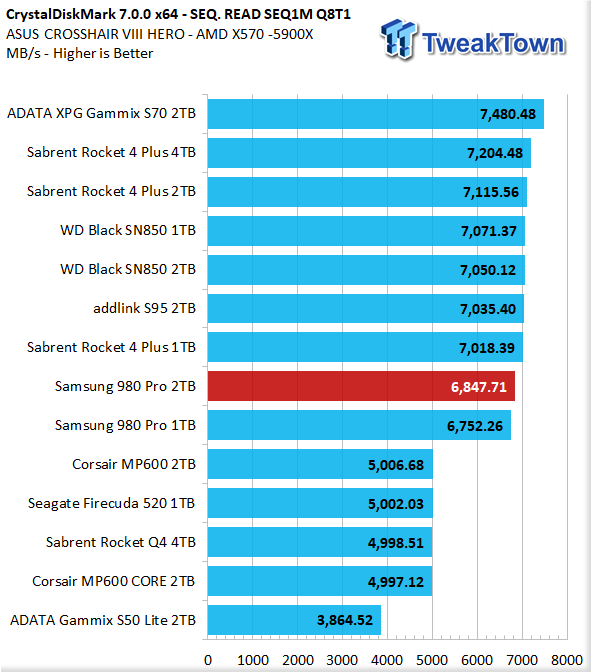
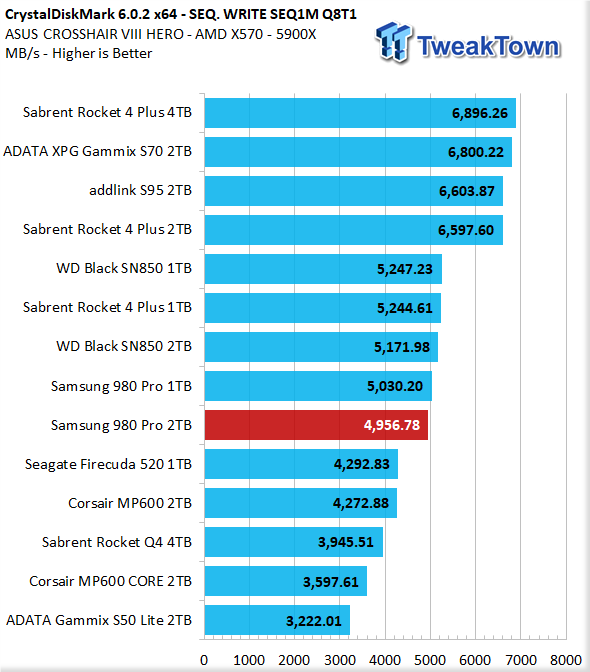
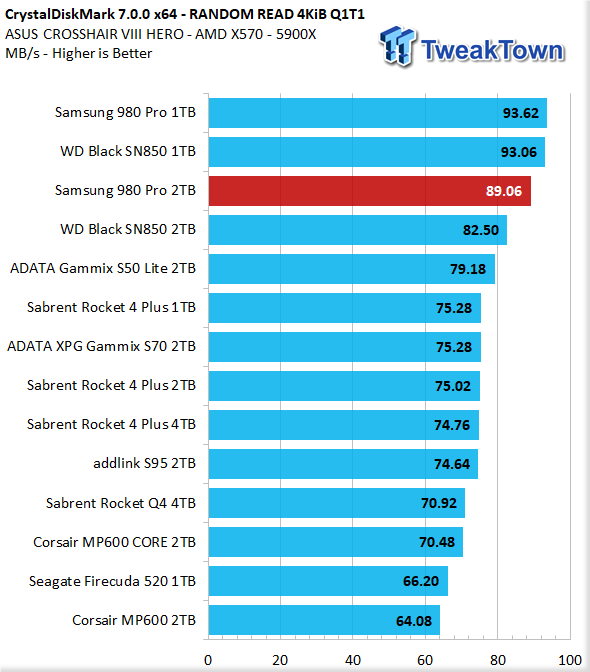
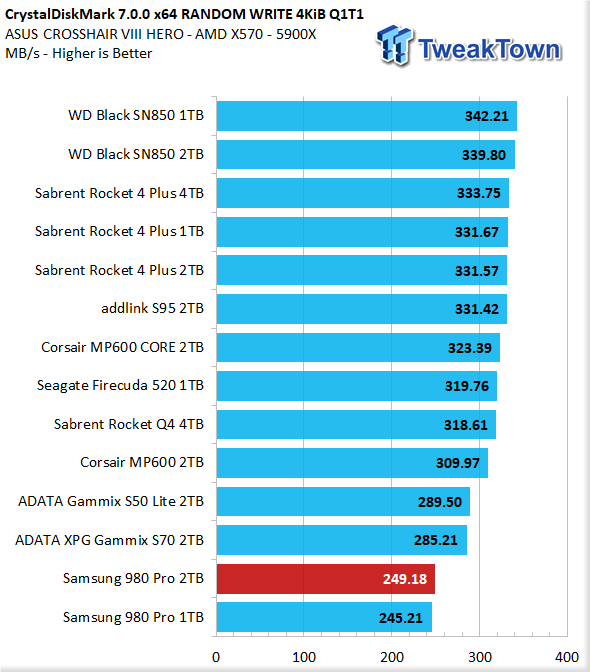
When Samsung's 980 Pro launched back in September of 2020, it topped our charts as the sequential throughput leader for both reads and writes. Today, there is a lot of competition that can deliver more throughput than the 980 Pro. Our test subject, like its older 1TB sibling, cannot hit advertised sequential speeds of 7,000/5,000 MB/s when tested against CDM.
However, look what happens when we employ a Samsung NVMe driver. BAM! The 980 Pro can easily exceed factory sequential specs. We feel like this is a significant amount of performance left off the table, and more importantly, the difference between hitting factory sequential specs with a standard benchmark vs. coming up short. Additionally, and more importantly, Q1T1 random performance is way up, which typically translates to better gaming and consumer workload performance, as we will demonstrate later in this review.
Anvil's Storage Utilities
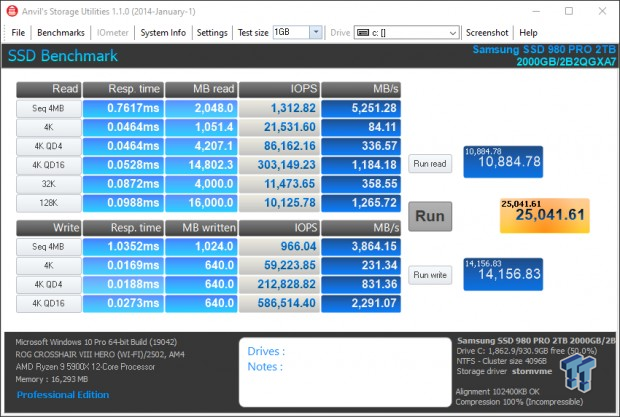
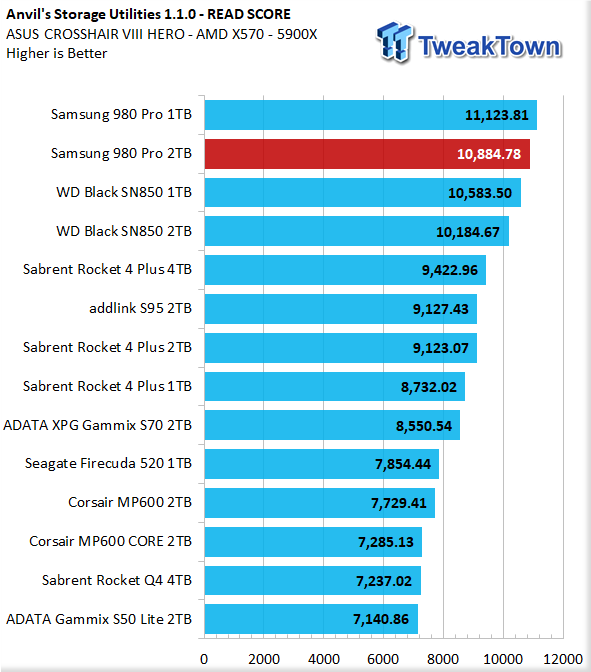
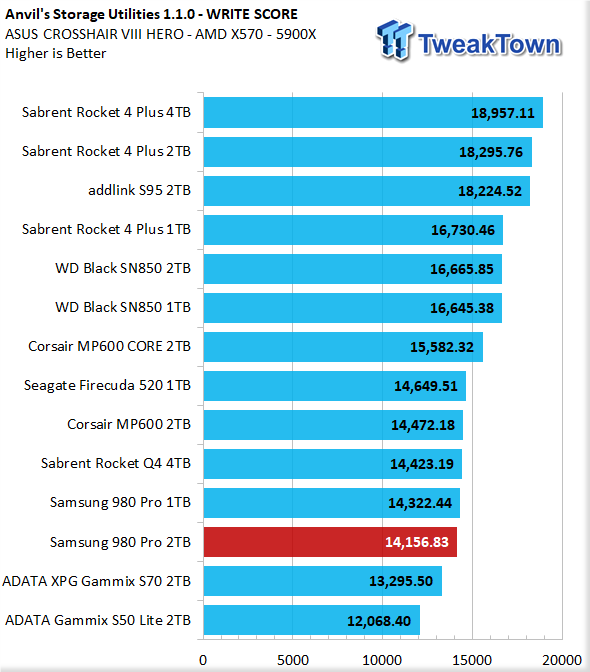
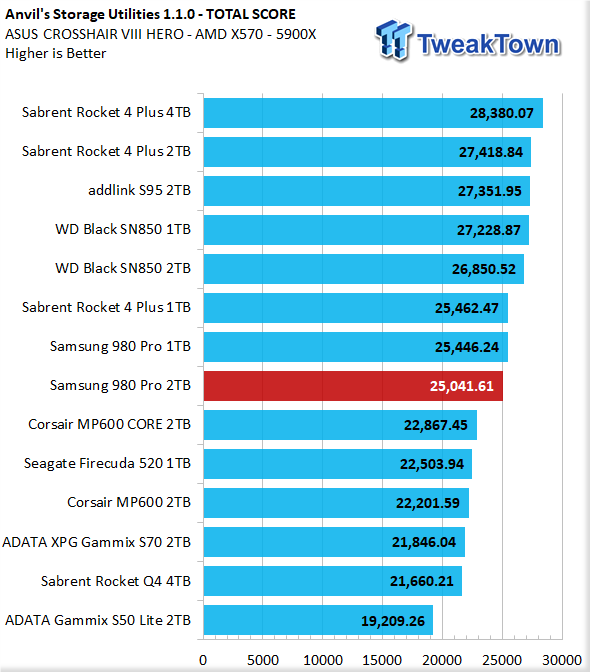
The 980 Pro is what we would call a read-centric SSD, as demonstrated by its chart-topping total read score. This is what we have always loved and continue to love about Samsung's Pro series SSDs. Additionally, the 980 Pro can deliver a stout overall score of 25K.
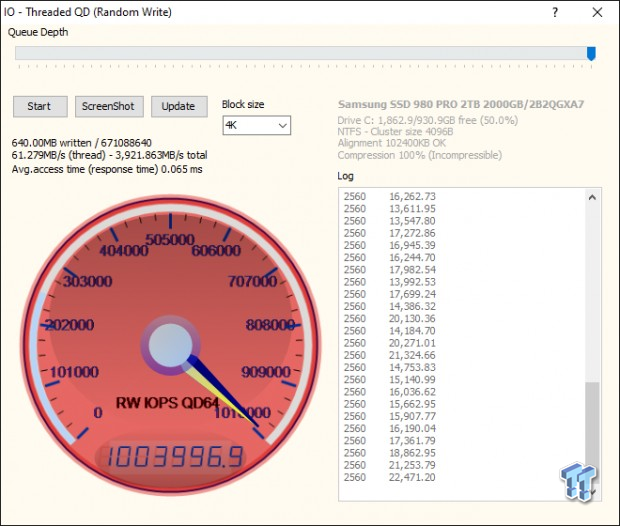
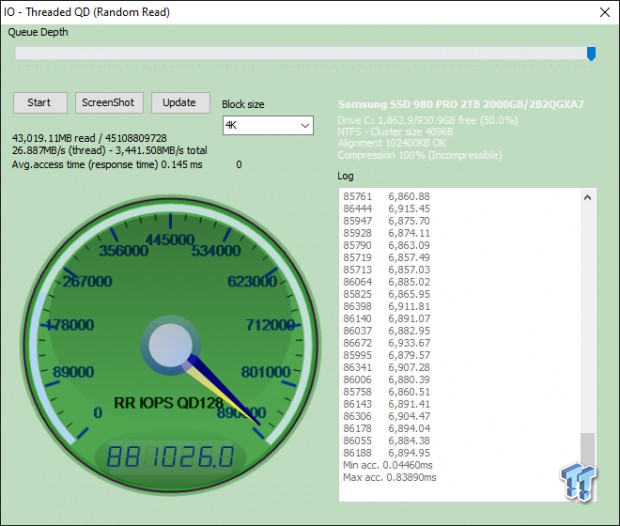
Samsung rates the 1TB and 2TB 980 Pro as capable of delivering up to 1,000,000 random IOPS. We can get there with QD64 random writes but fall a bit short with random reads at QD128. Nevertheless, a very impressive showing by Samsung's flagship consumer SSD.
Synthetic Benchmarks: AS SSD & ATTO
AS SSD
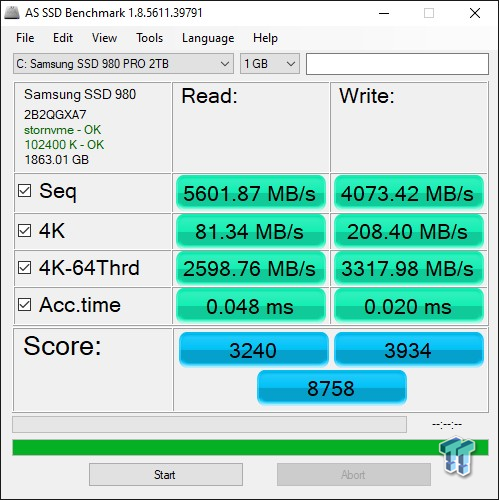
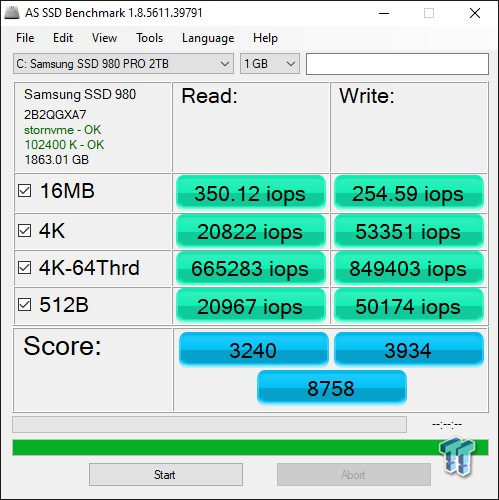
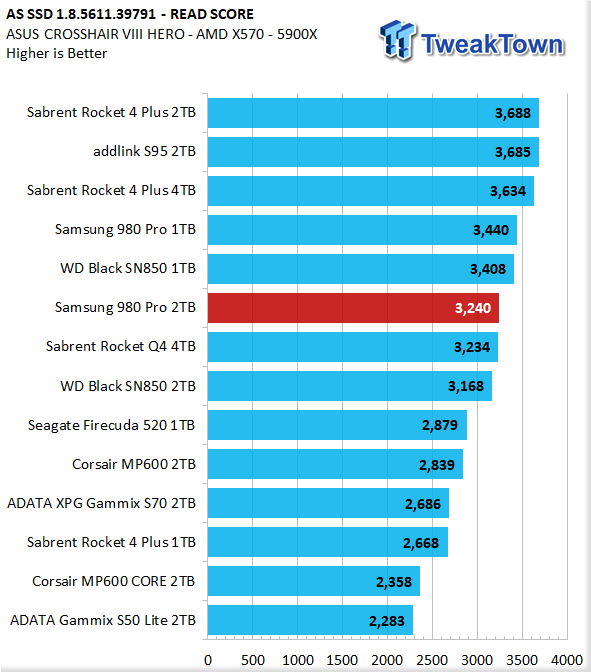
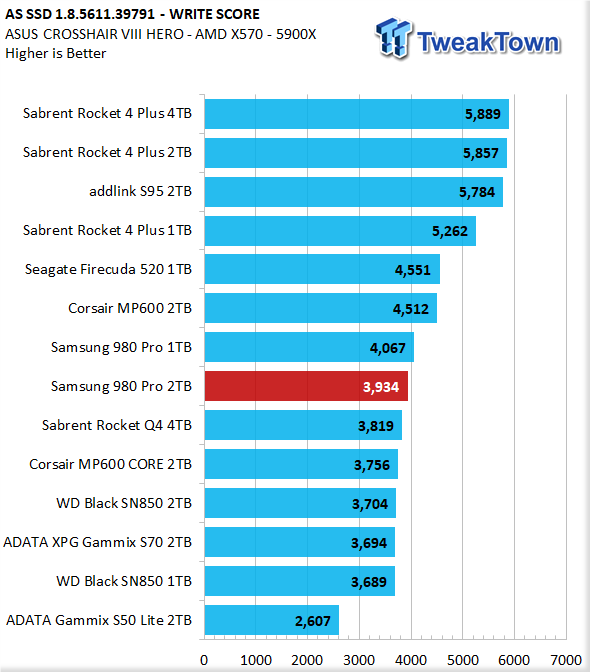
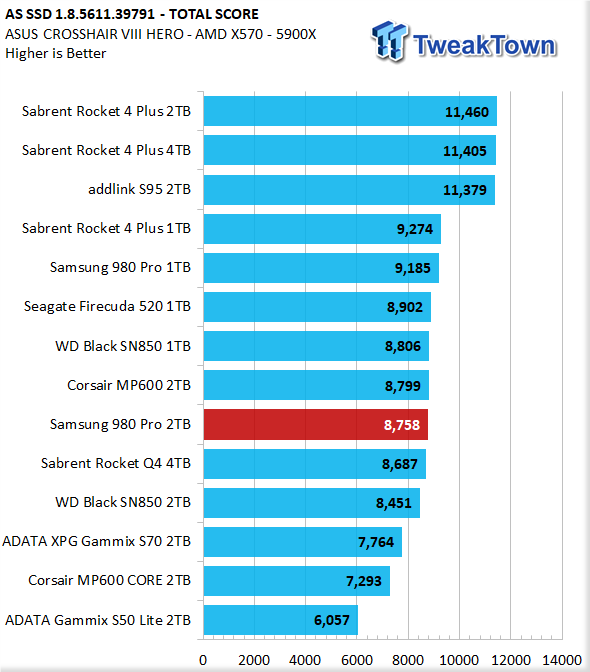
The 980 Pro delivers average overall performance for a Gen4 SSD when tested against AS SSD. Again, we see the drive's read performance charts higher than its write performance.
ATTO
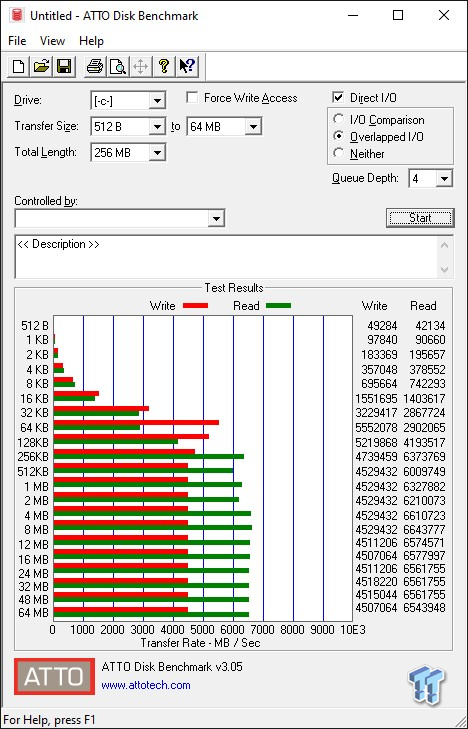
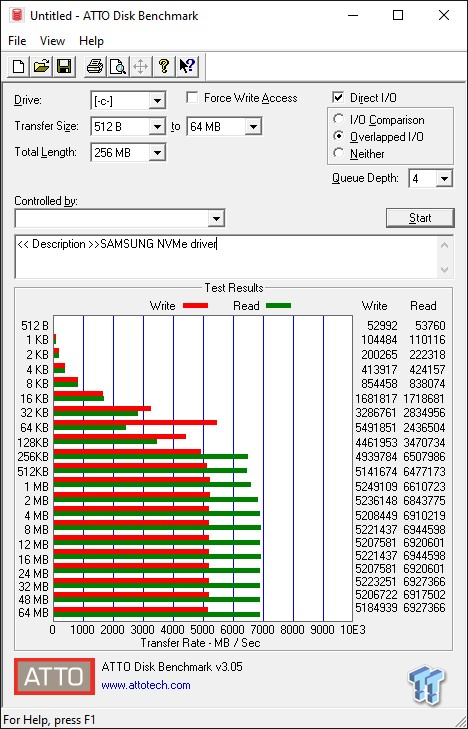
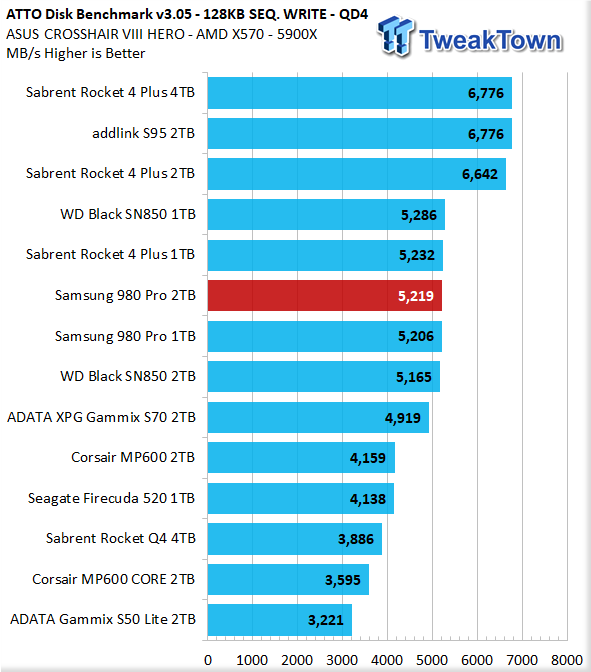
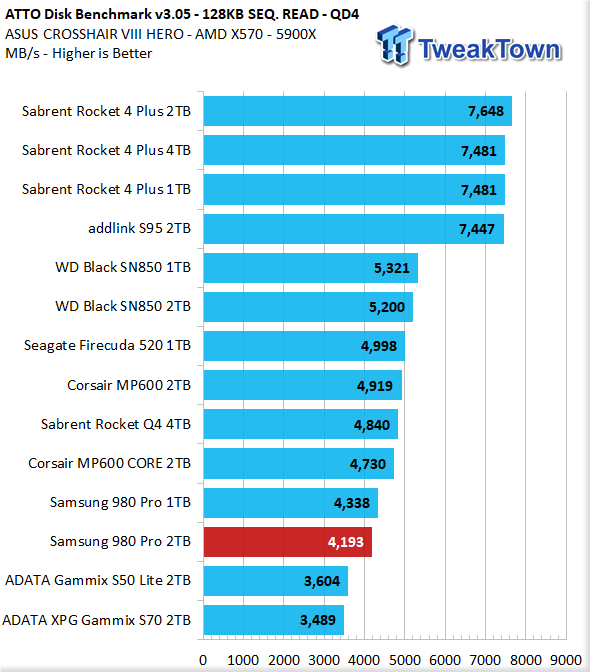
Here we will again post a screenshot of the 2TB 980 Pro running on Samsung's NVMe driver for comparison. Samsung's NVMe driver can deliver roughly 700 MB/s higher sequential writes and roughly 250 MB/s higher sequential reads at 512KB - 64MB transfers. Pretty big difference as we see it, at least on paper.
Real-World Testing: Transfer Rates & Gaming
Transfer Rates
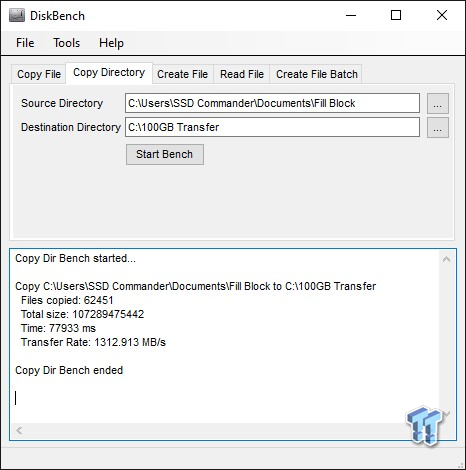
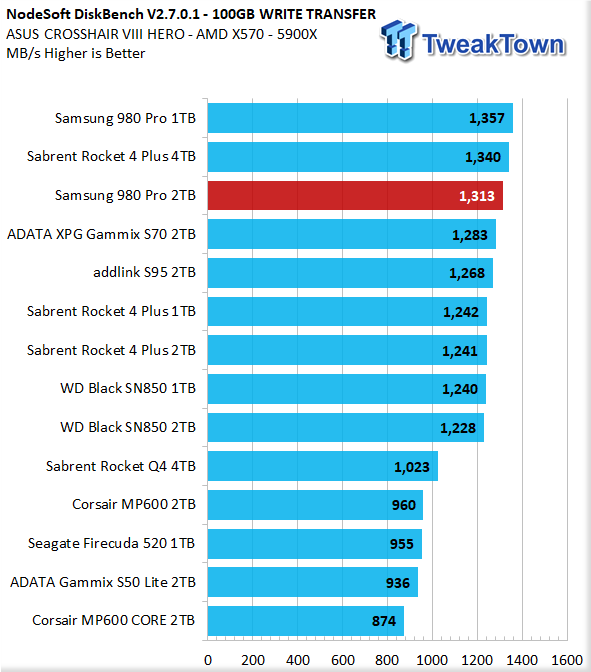
As expected, the 2TB 980 Pro transfers our 100-gigabyte data block at near record speed. It's slightly slower than our current leader which happens to be its older 1TB sibling. Impressive.
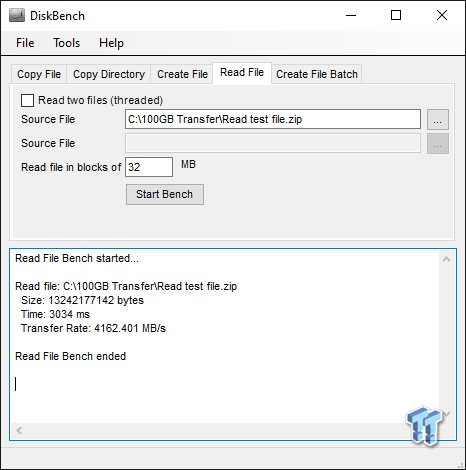
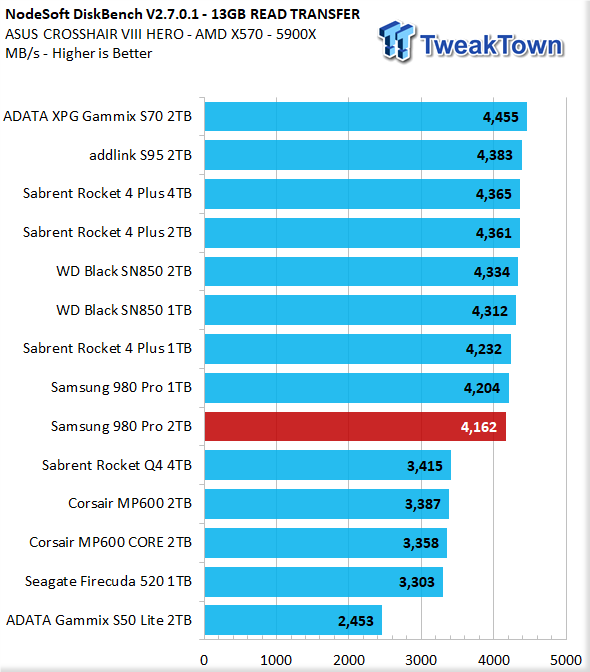
The 2TB 980 Pro serves data to the host almost as fast as the 1TB model. However, the 980 Pro in either capacity is the slowest of what we call the hyper-class Gen4 SSD on our chart.
Game Level Loading
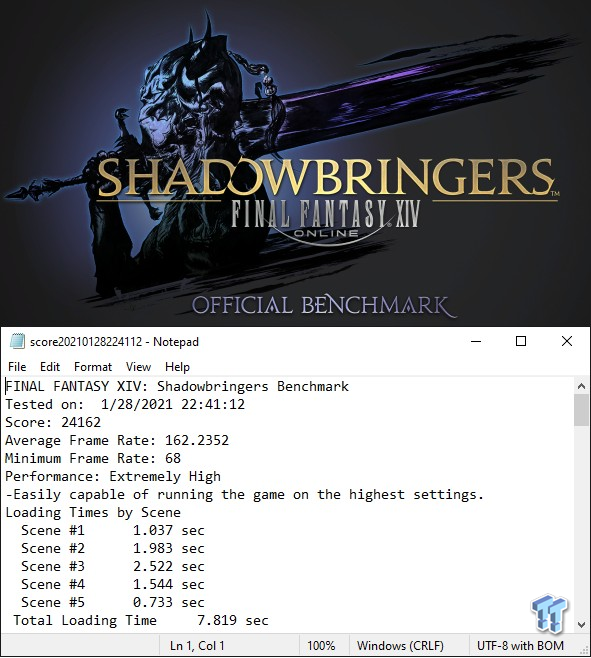
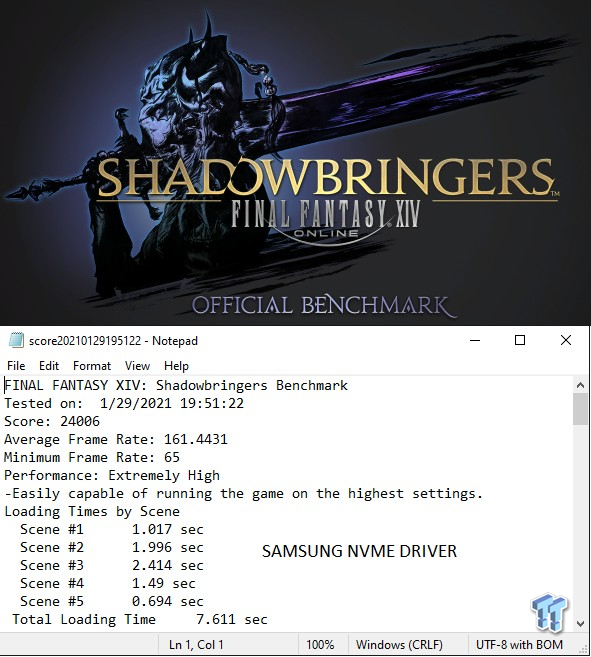
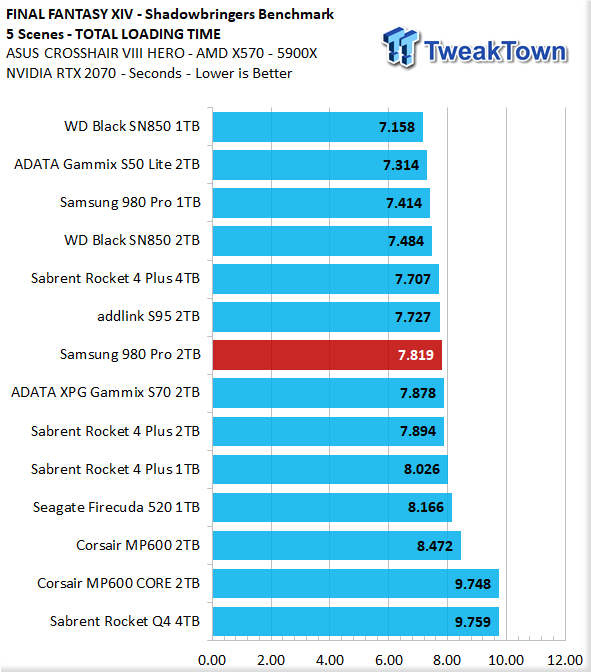
Again, we can see what a difference a driver can make. And again, we see that the 2TB 980 Pro is slightly slower than its 1TB sibling. However, we give the nod to the 2TB 980 Pro for a gaming SSD because it's still super-fast, and it can hold twice as many games as the 1TB model.
Real-World Testing: PCMark 10 Storage Tests
PCMark 10 Storage Test is the most advanced and most accurate real-world consumer storage test ever made. There are four different tests you can choose from; we run two of them.
The Full System Drive Benchmark and the Quick System Drive Benchmark. The Full System Drive Benchmark writes 204 GB of data over the duration of the test. The Quick System Drive Benchmark writes 23 GB of data over the duration of the test. These tests directly correlate with user experience. Of the two tests, we feel that the Quick System Drive Test most accurately replicates a typical user experience.
PCMark 10 Full System Drive Benchmark
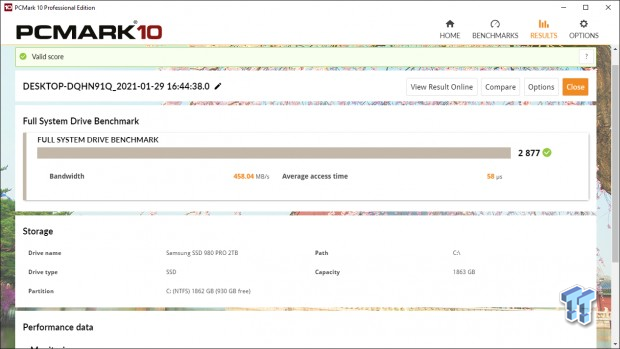
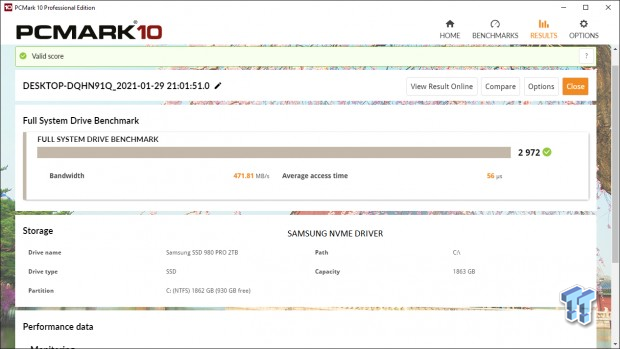
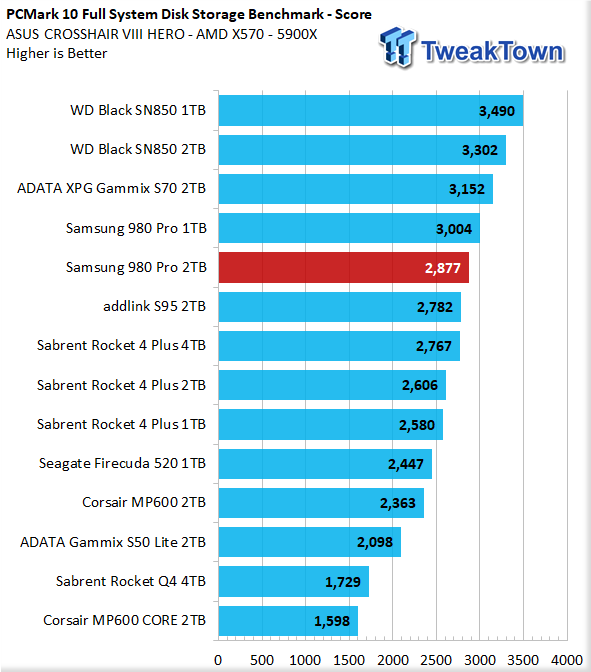
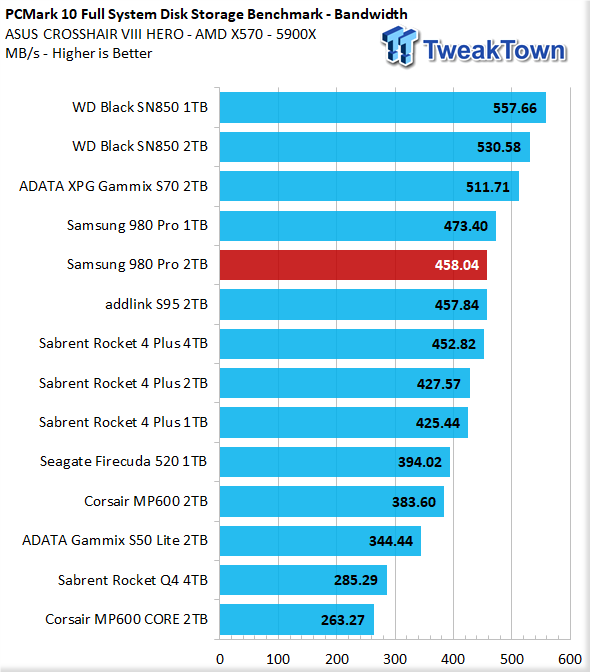
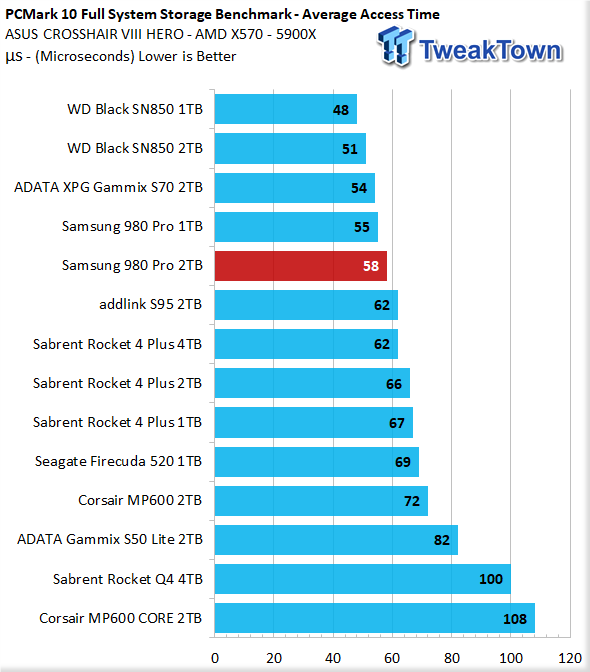
We will conclude our driver comparison with this benchmark. The Samsung driver delivers a higher score, more bandwidth, and lower latency. It's not a huge difference, but it's enough that we decided to show it. The 980 Pro, as demonstrated by how it places on our chart, can deliver some of the best heavy consumer workload performance of any SSD ever made. Impressive.
PCMark 10 Quick System Drive Benchmark
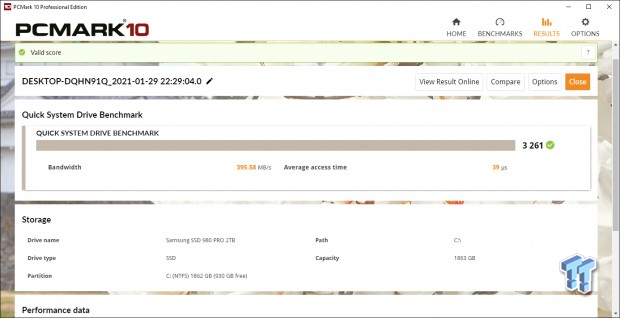
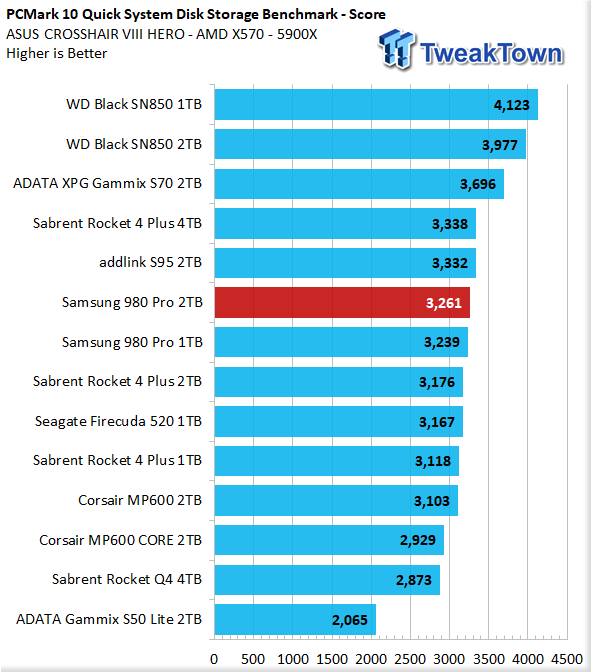
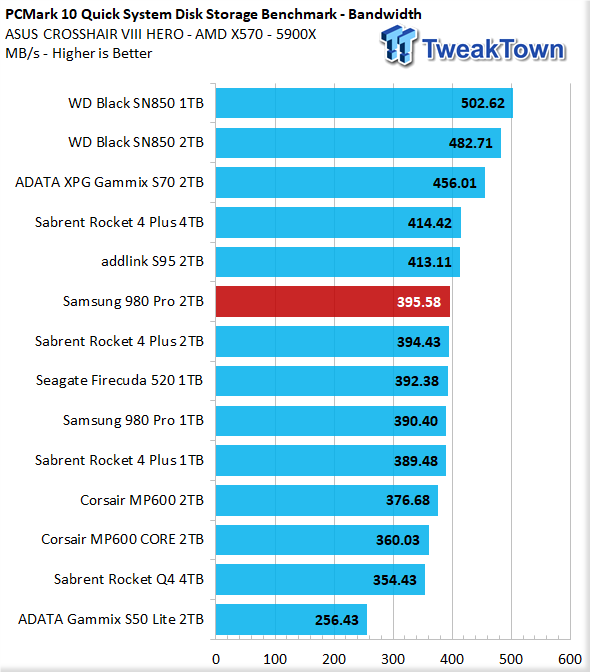
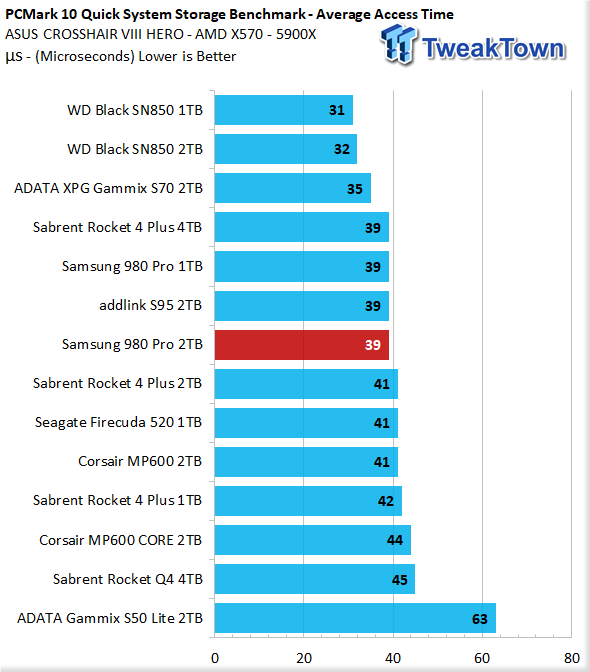
The 2TB 980 Pro, which has generally proven to be a bit slower than the 1TB model, somehow beats it this time and, in doing so, displays its prowess when handling moderate (normal) consumer workloads.
Final Thoughts
The 2TB 980 Pro is Samsung at its finest. The drive is an exquisite piece of hardware that will deliver everything you could want along with the capacity you need. It excels at read operations, and that's exactly where we like to see performance delivered most of all. Even though it would benefit, in some cases significantly, from Samsung's proprietary NVMe driver, it's still plenty fast running on the standard Win 10 NVMe driver.
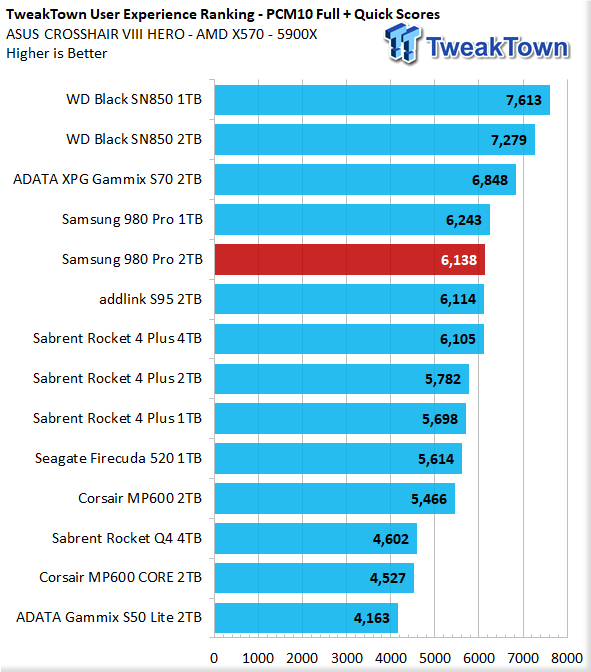
We rank SSDs in terms of overall user experience as expressed by PCMark 10 storage tests. These traces cover a broad spectrum of consumer applications, tasks, booting, copying, and even gaming. Samsung's 980 Pro Series delivers overall the third-best user experience of anything flash-based we've tested to date. Impressive.
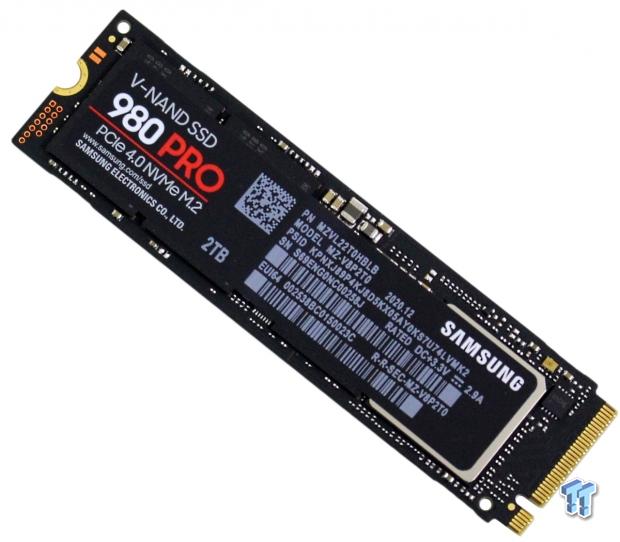
Our testing revealed the 2TB Samsung 980 Pro is a force to be reckoned with across the board. However, there are some performances that stand out from the rest. CDM results showed the 2TB 980 Pro delivering the best Q1T1 random read performance we've seen from a high-capacity flash-based SSD. Anvils showed that like its 1TB sibling, the 2TB 980 Pro has overall the highest synthetic read performance of any hyper-class SSD we've tested. Additionally, the 2TB 980 Pro served up a 1,000,000 IOPS random write performance and almost 900,000 random read IOPS. Impressive. Lastly and most importantly, this 2TB beast delivered some of the best overall user experience we've seen to date.
Samsung's 2TB 980 Pro delivers the form factor we prefer, the kind of performance we want, and the capacity point we desire. For these reasons, the 2TB Samsung 980 Pro has earned TweakTown's highest award.
Pros
- Read Performance
- Single Sided
- Free Software
- User Experience
Cons
- No Samsung Driver

Performance |
90% |
Quality |
99% |
Features |
98% |
Value |
90% |
Overall |
94% |
The 2TB Samsung 980 Pro gives us the performance we want and the capacity we need.

What's in Jon's PC?
- CPU: AMD Ryzen 7800X 3D
- MOTHERBOARD: GIGABYTE AORUS Master X670E
- RAM: Kingston Fury Renegade 7200MHz 32GB
- GPU: ZOTAC AMP Extreme GeForce RTX 4090
- SSD: Crucial T700 2TB Gen5
- OS: Windows 11 Pro
- COOLER: Lian Li Galahad 360 AIO
- CASE: Lian Li Lancool III
- KEYBOARD: Corsair K65 RGB Mini
- MOUSE: SteelSeries AEROX 5 Wireless
- MONITOR: ASUS ROG Strix PG27AQN 360Hz 1440p ULMB2
Similar Content
Related Tags

